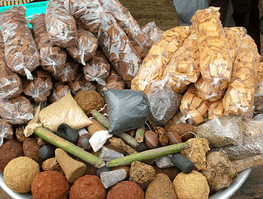Knowledge documentation on traditional medicines is vital – Professor Okine
 Professor Laud Kenneth Nii Okine of the Department of Biochemistry, Cell and Molecular Biology, University of Ghana, has said there is the need for the documentation of indigenous knowledge on traditional medicines.
Professor Laud Kenneth Nii Okine of the Department of Biochemistry, Cell and Molecular Biology, University of Ghana, has said there is the need for the documentation of indigenous knowledge on traditional medicines.
He said there is much indigenous knowledge on traditional medicines in Africa, however, not much of it had been documented.
“As part of the effort in the rapid development of herbal medicines, research scientists must show interest in the digitisation of this knowledge from our traditional healers,” Prof Okine said in his presentation at the Western Africa Network of Natural Product Research Scientists (WANNPRES)/Centre for Plant Medicine Research Mampong-Akuapem (CPMR) Conference in Accra.
The second WANNPRESS-Ghana Conference, on the theme: “The Role of Plant Medicine in Universal Health Coverage”, was organised by WANNPRES in collaboration with the CPMR and the Office of Research and Innovation Development of the University of Ghana.
Prof Okine said indigenous knowledge of medicinal plants should lead us to their scientific evaluation to support the claims made.
He said it was only after a thorough evaluation of the safety and efficacy in a standardisation regime that herbal medicines could be passed for rational use in humans; thus the manufacture of herbal medicines should be contingent upon relevant scientific data in support of their use.
Prof Okine said for plant medicines to play appropriate roles in achieving universal health coverage; products must be formulated based on meticulous scientific analysis.
“It is only when products are backed with the relevant scientific data, as pertains with orthodox medicines, that they will be universally accepted for administration to patients,” he said.
Prof Okine recalled that at the dawn of the new millennium, it became apparent after a systematic review of global healthcare systems, that there is no equity in the treatment and management of various diseases worldwide.
He said the World Health Organisation (WHO) developed the concept of Universal Health Coverage to address the inadequacies in global healthcare delivery systems.
He said one could not hide in his own small corner and think he could carry out ground-breaking research that would translate into the development of a first-class product in the shortest possible time, which would contribute to achieving universal health coverage.
“The only way to develop standard products in a timely manner is through collaborations both locally and internationally,” Prof Okine said.
He said in this regard, it is important that suspicions and lack of trust between traditional healers with indigenous knowledge and researchers as well as among researchers should be addressed.
“One way of overcoming this is by use of ‘memorandum of understanding’ within a legal framework.”
He said in the current unified simple but complex global system, the proper standard of packaging is of utmost importance.
“You can have the most potent and scientifically proven product, but if it is not well packaged under strict Good Manufacturing Practice (GMP) and International Standards Organisation (ISO) certification, it will not be patronised let alone help to achieve universal health coverage.
He said the policy of the Ministry of Health, which seeks to establish herbal units in selected regional and district hospitals across the country is a laudable one.
Prof Okine, who said the global herbal medicine industry was worth $71 billion annually, noted that some of the most profitable industries in the country were plant medicine based.
“If we pay the necessary attention to plant medicine, it will not only help us achieve universal health coverage, but it will greatly transform the economies of our countries.”
Dr Kofi Bobi Barimah, Acting Executive Director, CPMR, said there is a bright future for the development of herbal medicine in Ghana; adding that they were taking consolation in the fact that now herbal medicine is accessible in 40 healthcare facilities across the nation.
He said essential herbal medicine list was being developed with a view of including it in the National Health Insurance Scheme.
Dr Patrick Amoateng, Executive Secretary, WANNPRES, said they were seeking to revamp the organisation and restore it to its former state when it was first conceived by the late Prof Mariam Awurama Addy some 15 years ago.
He announced that Ghana would host the next WANNPRES Regional Conference in August 2020.
Source: GNA
